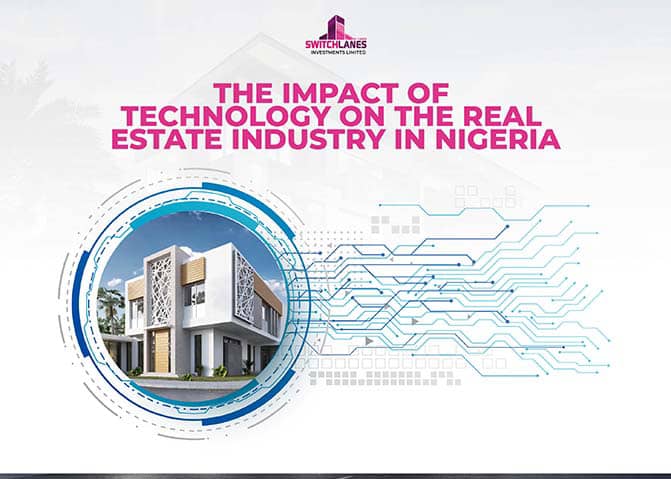Technology has revolutionized various industries, and the real estate sector is no exception. In Nigeria, advancements in technology have significantly impacted the way properties are bought, sold, and managed. From online property listings to virtual tours and digital transactions, technology has transformed the real estate landscape, making it more efficient, transparent, and accessible. In this comprehensive blog post, we will explore the various ways technology has influenced the real estate industry in Nigeria, including the benefits it brings, the challenges it poses, and the future implications for industry professionals and consumers.
Online Property Listings and Search Platforms :
Gone are the days when potential buyers had to rely solely on physical property visits or word-of-mouth referrals. Today, online property listings and search platforms have become the go-to resource for property seekers in Nigeria. Websites and mobile apps dedicated to real estate provide a vast database of properties, allowing users to search, filter, and compare listings based on their preferences. This technology has made the property search process more convenient, time-efficient, and accessible to a wider audience.
Virtual Tours and 3D Visualization :
Virtual tours and 3D visualization have transformed the way properties are showcased to potential buyers. With the help of advanced imaging technology, buyers can now explore properties remotely, experiencing a realistic and immersive virtual tour. This technology allows them to visualize the property’s layout, design, and features without physically visiting the location. Virtual tours save time, reduce the need for multiple property visits, and provide a more engaging and interactive experience for buyers.
Digital Transactions and E-signatures on Real Estate Industry in Nigeria:
Technology has streamlined the transaction process in the real estate industry through digital transactions and e-signatures. Buyers and sellers can now complete property transactions online, eliminating the need for physical paperwork and in-person meetings. Digital platforms facilitate secure and efficient transactions, including document signing, payment processing, and contract management. This technology has accelerated the transaction process, reduced paperwork errors, and increased transparency and accountability.
Data Analytics and Market Insights :
The availability of data analytics and market insights has empowered real estate professionals and investors in Nigeria. Technology enables the collection, analysis, and interpretation of vast amounts of data, providing valuable insights into market trends, property values, and investment opportunities.
paperwork and reducing the time and effort involved in the process. Digital transactions allow for secure and efficient transfer of funds, making it easier for buyers to make payments and sellers to receive them. Additionally, the use of e-signatures has made signing contracts and agreements more convenient and legally binding. This eliminates the need for physical meetings and allows parties to sign documents remotely, saving time and resources.
Data Analytics and Market Insights :
Technology has also revolutionized the way real estate professionals analyze market trends and make informed decisions. With the help of data analytics tools, real estate companies can gather and analyze vast amounts of data, including property prices, market demand, and customer preferences. This data-driven approach provides valuable insights into market trends, allowing professionals to make accurate predictions and strategic decisions. By understanding market dynamics, real estate companies can identify investment opportunities, optimize pricing strategies, and tailor their offerings to meet customer demands. Data analytics also enables real estate professionals to provide personalized recommendations to clients based on their preferences and budget, enhancing the overall customer experience.
Property Management and Maintenance :
Technology has greatly improved property management and maintenance processes in Nigeria. Property management software allows landlords and property managers to efficiently handle tasks such as rent collection, maintenance requests, and tenant communication. These platforms automate routine tasks, streamline communication, and provide a centralized database for property-related information. Additionally, the use of smart home technology has made it easier to monitor and control various aspects of property management, such as security systems, energy usage, and temperature control. This not only improves operational efficiency but also enhances the overall living experience for tenants.
Online Advertising and Marketing :
The advent of technology has transformed the way properties are advertised and marketed in Nigeria. Online platforms and social media have become powerful tools for real estate companies to reach a wider audience and showcase their properties. Through targeted online advertising, companies can reach potential buyers based on their preferences, demographics, and search behavior. This allows for more effective and efficient marketing campaigns, resulting in increased visibility and higher chances of attracting qualified buyers. Additionally, the use of virtual staging and 3D rendering technology has made it easier to create visually appealing and enticing property listings, capturing the attention of potential buyers.
Conclusion: Real Estate Industry in Nigeria
Technology has had a profound impact on the real estate industry in Nigeria. From transforming the way properties are showcased and marketed to streamlining transaction processes and enhancing property management, technology has revolutionized the way business is conducted. Embracing these technological advancements has become essential for real estate professionals to stay competitive and meet the evolving needs of buyers and sellers. As technology continues to advance, it is crucial for industry players to stay updated and leverage these tools to their advantage. By embracing technology, the real estate industry in Nigeria can become more efficient, transparent, and customer-centric, ultimately benefiting all stakeholders involved.
Also Read Other Articles From Real Estate Industry In Nigeria
-
Unveiling the Secrets: Unraveling the Best Real Estate Deals in Lagos
-
5 Mistakes to Avoid When Buying a Home in Lagos
-
Understanding Property Laws in Nigeria: A Guide for Buyers and Sellers
-
The Pros And Cons of Renting Vs Owning a Home Worksheet in Nigeria
-
Investing In Real Estate Vs Other Forms of Investment in Nigeria
- Nigerias Real Estate Sector Challenges and the Way Forward



